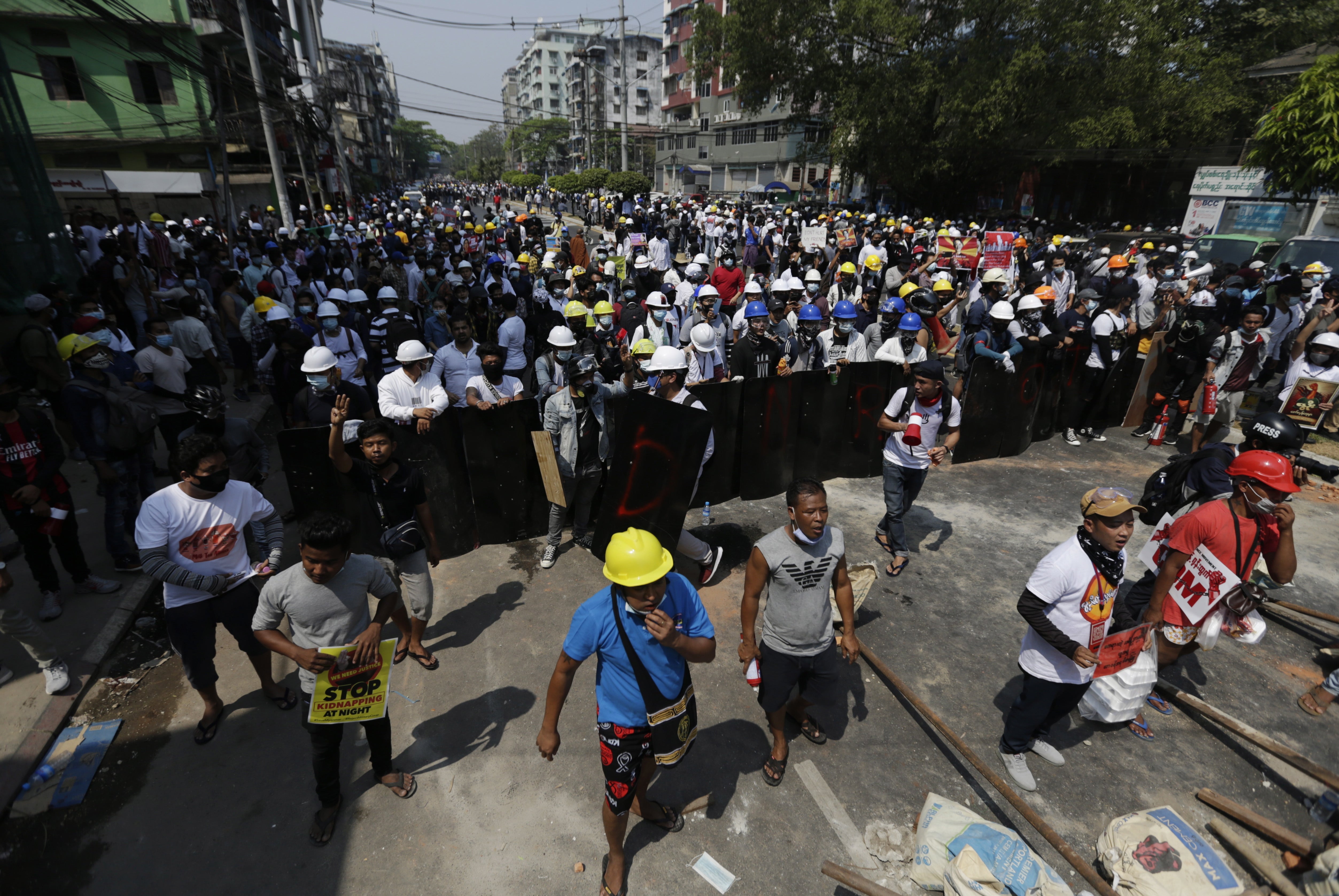Myanmar protests: At least 18 killed and 1,000 arrested as police open fire on demonstrators
Myanmar has been in turmoil since the army seized power and detained leader Aung San Suu Kyi

Your support helps us to tell the story
From reproductive rights to climate change to Big Tech, The Independent is on the ground when the story is developing. Whether it's investigating the financials of Elon Musk's pro-Trump PAC or producing our latest documentary, 'The A Word', which shines a light on the American women fighting for reproductive rights, we know how important it is to parse out the facts from the messaging.
At such a critical moment in US history, we need reporters on the ground. Your donation allows us to keep sending journalists to speak to both sides of the story.
The Independent is trusted by Americans across the entire political spectrum. And unlike many other quality news outlets, we choose not to lock Americans out of our reporting and analysis with paywalls. We believe quality journalism should be available to everyone, paid for by those who can afford it.
Your support makes all the difference.Police opened fire and reportedly killed at least 18 people as protests against military rule in Myanmar continue to grip the southeast Asian nation.
Dozens more were left wounded in clashes and more than 1,000 people were arrested on Sunday as authorities cracked down brutally on on demonstrations.
The UN Human Rights Office said it has received “credible information” at least 18 had died and 30 others injured.
A report by the independent Assistance Association of Political Prisoners said it was aware of around 1,000 people who have been detained on Sunday, of whom they were able to identify 270.
An Associated Press journalist was among those detained by police while covering the protests. Thein Zaw, 32, was taken into custody with a number of others on Saturday morning in Yangon.
It brings the number of people confirmed being arrested, charged or sentenced since the coup to 1,132.
Sunday was been the most deadly day since protest against the military coup in Myanmar earlier this month.
A woman also died after police broke up a teachers' protest with stun grenades in the main city of Yangon, though the cause of her death was not known, her daughter and a colleague said.
Thousands have been drawn to the streets since the military coup earlier this month, which saw the army seize power and detain elected government leader Aung San Suu Kyi and much of her party leadership.
The military alleges fraud in November’s election, in which Ms Suu Kyi’s party won in a landslide, but the coup has received the condemnation of western countries.
"Myanmar is like a battlefield," the Buddhist-majority country's first Catholic cardinal, Charles Maung Bo, tweeted.
Police opened fire in different parts of Yangon after stun grenades and tear gas failed to disperse crowds.
A man died after being brought to a hospital with a bullet wound in the chest, said a doctor at the hospital.
Police also opened fire in the southern town of Dawei, killing three and wounding several, local politician Kyaw Min Htike told Reuters.
The Irrawaddy online media outlet reported one person had been killed in the second city of Mandalay, where police also cracked down, while a charity reported two dead in the central town of Bago.
Police also cracked down in the northeastern town of Lashio and Myeik in the deep south, residents and media reported.
Junta leader General Min Aung Hlaing said last week authorities were using minimal force to deal with the protests.
Nevertheless, at least five protesters have died in the turmoil. The army said a policeman has been killed.
The latest escalation appears to be an attempt by the military to exercise its authority over those demonstrating against the coup since 1 February.
In Yangon, several people were helped away, leaving blood-smeared pavements, after police fired, images posted by media showed.
Police also threw stun grenades, used tear gas and fired into the air, witnesses said. Hundreds of protesters refused to back down by early afternoon.
Some marched, some gathered to chant and sing and others set up barricades.
"If they push us, we'll rise. If they attack us, we'll defend. We'll never kneel down to the military boots," said Nyan Win Shein from one Yangon protest.
The UK government said on Sunday that escalating violence against protesters was abhorrent and it called on the Myanmar’s military leaders to restore democracy.
“The UK has taken action by imposing human rights sanctions against nine Myanmar military officers, including the commander-in-chief, for their role in the coup,” a spokeswoman for the Foreign Office said.
“We are clear that this violence must stop and democracy must be restored.”




Join our commenting forum
Join thought-provoking conversations, follow other Independent readers and see their replies
Comments